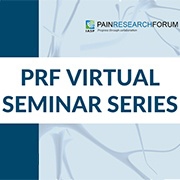Editor’s note: This is the 10th in a series of weekly PRF seminars designed to help keep the pain research community connected during the COVID-19 pandemic and to provide all members of our community with virtual educational opportunities. The seminar series is supported by the Center for Advanced Pain Studies at the University of Texas at Dallas, US.
On July 6, 2020, the IASP Pain Research Forum hosted a seminar with Smriti Iyengar, PhD, NINDS, NIH, Bethesda, US, and Barbara Karp, MD, NINDS, NIH. A Q&A session moderated by Michael Gold, PhD, University of Pittsburgh, US,followed the presentation.

- Smriti Iyengar, NINDS, NIH, Bethesda, US
- Barbara Karp, NINDS, NIH, Bethesda, US
- Michael Gold, University of Pittsburgh, US
A recording of this seminar will soon be freely available to IASP members at the IASP Pain Education Resource Center (PERC).
Here is an abstract from the presenters
The NIH Helping to End Addiction Long-term (HEAL)SM Initiative is a trans-agency effort to advance scientific solutions to stem the opioid crisis. Within the HEAL Initiative, the National Institute of Neurological Disorders and Stroke (NINDS) is focused on understanding pain mechanisms as well as identifying and developing non-opioid, non-addictive pain therapeutics. This PRF seminar will focus on two NIH HEAL Initiative programs: The Preclinical Screening Platform for Pain (PSPP) and the Early Phase Pain Investigation Clinical Network (EPPIC-Net). Both programs evaluate therapeutic assets for pain indications. Applications for PSPP and EPPIC-Net are accepted from academic and industry sponsors from within and outside of the US on an ongoing basis. Preclinical testing within PSPP and Phase 2 clinical trials within EPPIC-Net are provided without cost to accepted applicants.
PSPP provides a one-stop resource platform to identify and profile non-opioid, non-addictive therapeutics for pain with evaluation in a range of assays and models. A key feature of the PSPP is the flexibility to acquire and validate innovative preclinical models that more closely represent human pain conditions, including headache, and then use these models to characterize promising therapeutic candidates submitted by asset owners accepted into the program.
To accelerate and enhance early-phase pain clinical trials, NINDS has established the Early Phase Pain Investigation Clinical Network (EPPIC-Net). EPPIC-Net accepts applications from those with pain therapeutics for conditions of high unmet need, including novel and repurposed drugs and devices. EPPIC-Net studies can incorporate proof-of-concept testing, target pathway or mechanism validation, and validate biomarkers of target engagement or pain outcomes.
This seminar will provide information on the structure and function of PSPP and EPPIC-Net, as well as on the application and review process for each program.
About the presenters
Smriti Iyengar, PhD, is program director for the newly formed Preclinical Screening Platform for Pain (PSPP) program, in the Division of Translational Research, at NINDS. She is an adjunct senior research professor in the Department of Anesthesia, and in the Department of Clinical Pharmacology at the Indiana University School of Medicine. She was formerly at Eli Lilly and Company, and prior to that at G.D. Searle and Company, Schering-Plough Inc., and Ciba Geigy. She is a neuroscientist with extensive research experience focused on neuro-disorders including pain and headache. Her drug discovery expertise includes target, lead, and clinical candidate identification and characterization as well as translational and clinical development, regulatory strategy, launch, and commercialization. Her postdoctoral training was at Rutgers University as a Charles and Johanna Busch Fellow in the Department of Physiology and Neuroscience, with her research focused on central regulation of opioid function and central regulation of neuroendocrine function including the HPA axis and stress. She received her PhD from M.S. University of Baroda, India, where she worked on the neurochemical basis of behavior in the developing brain.
Barbara Illowsky Karp, MD, received her undergraduate degree and master's degree in biochemistry from MIT. After completing medical school at the Columbia University College of Physicians and Surgeons, she moved to the DC area for internship, residency in neurology, and fellowship in behavioral neurology. She served as chief of the NIH/NINDS Neurology Consultation Service. She established the multi-institute NIH Combined NeuroScience IRB in 2006 and served as its chair until February 2019. Her clinical practice and research have focused on movement disorders and therapeutic applications of botulinum toxin. Her research on botulinum toxin extends to its use in chronic pelvic pain in women, which led to her current position as program director for EPPIC-Net.
About the moderator
Michael Gold, PhD, is a Professor of Neurobiology at the University of Pittsburgh, US. Dr. Gold received his B.A. from UC Berkeley, Ph.D. from UCLA, and was a postdoctoral fellow with Jon Levine at USCF. For the last twenty years, Gold’s research focused on the neurobiology of pain. He has made important contributions to understanding injury-induced plasticity in nociceptive afferents, and their contribution to the manifestation of persistent pain. Toward this end, he has employed an array of approaches ranging from the study of isolated cells to the development of novel behavioral assays with which to assess the presence of persistent hypersensitivity, and more recently the study of clinical populations suffering from persistent pain.
Join the conversation about the seminar on Twitter @PainResForum #PRFSeminar
We thank the Center for Advanced Pain Studies at the University of Texas at Dallas, US, for its support of the PRF seminar series.



